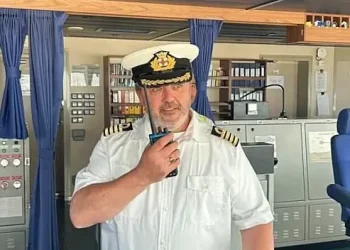The UK government has announced a maritime decarbonisation strategy, aiming for net-zero emissions by 2050.
This initiative, unveiled in London, seeks to reduce shipping emissions by 30% by 2030 and 80% by 2040, promising cleaner air and economic growth through green technology investments.
Maritime Decarbonisation: UK’s Ambitious Plan
The UK government’s new maritime decarbonisation strategy is a significant step towards achieving net-zero emissions by 2050. This plan includes the development of “chargeports” for vessels and the adoption of clean fuels such as hydrogen and ammonia.
The strategy aims to reduce shipping emissions by 30% by 2030 and 80% by 2040, aligning with the UK’s broader goal of becoming a clean energy superpower.
Economic Opportunities in Coastal Communities
- Creation of new jobs in green technologies
- Stimulated economic growth in coastal areas
- Increased investment in clean maritime infrastructure
- Enhanced global competitiveness for UK ports
- Support for innovation through public-private partnerships
Cleaner Air and Job Creation
This strategy is expected to have a profound impact on people living in coastal regions. By reducing emissions, it promises cleaner air and water, contributing to improved health outcomes.
Additionally, the focus on green technologies is anticipated to create numerous job opportunities, fostering economic resilience in these communities.
Industry Leaders Weigh In
Maritime Minister, Mike Kane, said:
“Climate change is one of the greatest challenges we face today. Working together with industry and international partners, we are driving down emissions in every corner of the economy.
As part of our Plan for Change, we’re committed to making the UK a green energy superpower and our maritime decarbonisation strategy will help us build a cleaner, more resilient maritime nation.”
Richard Ballantyne OBE, Chief Executive of the British Ports Association, said:
“We welcome today’s announcement. UK ports are already demonstrating their commitment to net zero with ambitious targets and investment in new technologies and fuels. The UK SHORE programme shows what can be achieved when government and industry work together on shared goals.
We will continue to work closely with the Department for Transport on lowering barriers to investment and decarbonisation for both ports and vessels and this strategy will help set a clear direction and expectations well into the future. We look forward to a continued close partnership built on common aims.”
Chris Shirling-Rooke, Chief Executive of Maritime UK, said:
“Decarbonisation is both an enormous challenge and opportunity for the maritime sector, with huge potential for growth, jobs and innovation in our coastal communities, and across the whole of the United Kingdom.
It is vital that our country continues to drive change and chase growth by creating a cleaner and more sustainable future. We welcome the government’s commitment today and look forward to continuing to work with them on the maritime decarbonisation strategy.”
Mike Sellers, Director of Portsmouth International Port, said:
“We welcome the announcement of the new maritime decarbonisation strategy, which the port’s master plan very much aligns with.
To help achieve this ambition, we’re on track to become the UK’s first multi-berth, multi-ship ‘chargeport’ by providing renewable plug-in energy when ships are alongside from spring 2025.
The seachange shore power project, demonstrates the success of both public and private investment, supported by the government’s zero emissions vessels and infrastructure (ZEVI) fund, driving innovation towards net zero. We’re pleased to show the minister what’s happening in Portsmouth and how this could be a model for ports across the country.”
A Global Influence on Maritime Standards
The UK’s leadership in maritime decarbonisation could set a precedent internationally.
By advocating for similar reductions at the International Maritime Organization (IMO), the UK hopes to influence global policies and encourage other nations to adopt ambitious emissions targets.
This move not only positions the UK as a leader but also contributes significantly to global climate efforts.
Additional Reading
Food for Thought
The UK’s maritime decarbonisation strategy marks a pivotal moment in its journey towards sustainability.
By setting ambitious targets and fostering innovation, this initiative not only addresses environmental concerns but also promises economic revitalization for coastal communities.
As these plans unfold, they hold potential benefits that extend beyond national borders.
Discover more of Todays Top Breaking News Stories!
Sources: UK Government, British Ports Association, Maritime UK, Department for Transport and Mike Kane MP.
Ivan Alexander Golden, Founder of THX News™, an independent news organization dedicated to providing insightful analysis on current events, prepared this article.









